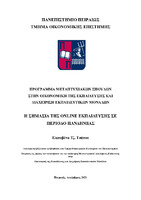| dc.contributor.advisor | Παντελίδης, Παντελής | |
| dc.contributor.author | Τσάπου, Ελισαβέτα | |
| dc.date.accessioned | 2022-01-11T09:46:41Z | |
| dc.date.available | 2022-01-11T09:46:41Z | |
| dc.date.issued | 2021-12 | |
| dc.identifier.uri | https://dione.lib.unipi.gr/xmlui/handle/unipi/14025 | |
| dc.identifier.uri | http://dx.doi.org/10.26267/unipi_dione/1448 | |
| dc.description.abstract | Στόχος της παρούσας διπλωματικής εργασίας, είναι ο εντοπισμός μέσω βιβλιογραφικής επισκόπησης, των προκλήσεων που αντιμετώπισε η εκπαιδευτική κοινότητα, κατά την εφαρμογή της online εκπαίδευσης, στην περίοδο της πανδημίας COVID-19, καθώς και των παραγόντων που συνέβαλαν στην εμφάνιση αυτών των προκλήσεων, προκειμένου, μέσω των λύσεων που θα προταθούν, να αναδειχθεί η σημασία αυτής της μορφής εκπαίδευσης σε περιόδους κρίσεων. Οι προκλήσεις που εντοπίστηκαν βιβλιογραφικά σχετίζονται με δυσκολίες χρήσης των τεχνολογικών μέσων καθώς και με προβλήματα στις κύριες λειτουργίες της εκπαιδευτικής διαδικασίας, όπως η επικοινωνία μεταξύ εκπαιδευτικού και εκπαιδευόμενων αλλά και μεταξύ των εκπαιδευόμενων, η διαχείριση της ηλεκτρονική τάξης, η δημιουργία ενός ελκυστικού και ενδιαφέροντος περιβάλλοντος μάθησης και η αξιολόγηση και ανατροφοδότηση των εκπαιδευόμενων. Οι παράγοντες που συντέλεσαν στη δημιουργία αυτών των εμποδίων είναι: η έλλειψη κατάλληλων τεχνολογικών υποδομών τόσο κατ’οίκον, όσο και στις εκπαιδευτικές μονάδες, η έλλειψη ψηφιακών δεξιοτήτων των εκπαιδευόμενων, η έλλειψη αρχικής πανεπιστημιακής εκπαίδευσης και η αποσπασματική και μη στοχευμένη κατάρτιση των μελλοντικών εκπαιδευτικών στις ΤΠΕ, η απουσία κατάλληλου ψηφιακού εκπαιδευτικού υλικού, που να καλύπτει τις ανάγκες τόσο των εκπαιδευόμενων όσο και του αναλυτικού προγράμματος σπουδών και το ότι η online εκπαίδευση δεν αποτελεί μέρος της μαθησιακής κουλτούρας, γεγονός που ενισχύει τις αντιλήψεις ότι αυτή η μορφή εκπαίδευσης δεν μπορεί να καλύψει τις ανάγκες των εκπαιδευόμενων. Από τα προαναφερθέντα ευρήματα, προέκυψε ότι προκειμένου η online εκπαίδευση να μην απομακρύνεται από την αντίληψη της γνώσης ως κοινωνική αξία, απαιτείται ένας αποτελεσματικά οργανωμένος και μακροπρόθεσμος εκπαιδευτικός σχεδιασμός, ο οποίος θα περιλαμβάνει: (α) την ένταξη των ΤΠΕ στο αναλυτικό πρόγραμμα σπουδών υπό το πρίσμα μιας κριτικής παιδαγωγικής αντίληψης, (β) την επιμόρφωση των εκπαιδευτικών στις ΤΠΕ και (γ) την αναβάθμιση των τεχνολογικών υποδομών των εκπαιδευτικών μονάδων. | el |
| dc.format.extent | 69 | el |
| dc.language.iso | el | el |
| dc.publisher | Πανεπιστήμιο Πειραιώς | el |
| dc.rights | Αναφορά Δημιουργού-Μη Εμπορική Χρήση-Όχι Παράγωγα Έργα 3.0 Ελλάδα | * |
| dc.rights | Αναφορά Δημιουργού-Μη Εμπορική Χρήση-Όχι Παράγωγα Έργα 3.0 Ελλάδα | * |
| dc.rights.uri | http://creativecommons.org/licenses/by-nc-nd/3.0/gr/ | * |
| dc.title | Η σημασία της online εκπαίδευσης σε περίοδο πανδημίας | el |
| dc.type | Master Thesis | el |
| dc.contributor.department | Σχολή Οικονομικών, Επιχειρηματικών και Διεθνών Σπουδών. Τμήμα Οικονομικής Επιστήμης | el |
| dc.description.abstractEN | The aim of this dissertation is to identify, through bibliographic review, the challenges faced by the educational community, during the implementation of online education, due to COVID-19 pandemic, as well as the factors that contributed to the emergence of these challenges, in order, through the solutions that will be proposed, to highlight the importance of this form of education in times of crisis. Those challenges are related to the difficulties in the use of technological means and to the problems in the main functions of the educational process, such as communication between teacher and learners, e-classroom management, creating an attractive and interesting learning environment and the evaluation and feedback of learners. The factors that contributed to the creation of these barriers are: the lack of appropriate technological infrastructure both at home and in the educational units, the lack of digital skills of the trainees, the lack of initial university education and the fragmentary and non-targeted training of future teachers in ICT, the lack of appropriate digital educational materials to meet the needs of both learners and the curriculum and the fact that online education is not part of the learning culture, which reinforces the perception that this form of education can not meet the needs of the trainees. From the above findings, it emerged that in order for online education not to deviate from the perception of knowledge as a social value, an effectively organized and long-term educational planning is required, which will include: (a) the inclusion of ICT in the curriculum under in the light of a critical pedagogical concept, (b) the training of teachers in ICT and (c) the upgrading of the technological infrastructure of the educational units. | el |
| dc.contributor.master | Οικονομική της Εκπαίδευσης και Διαχείριση Εκπαιδευτικών Μονάδων | el |
| dc.subject.keyword | Εξ αποστάσεως εκπαίδευση | el |
| dc.subject.keyword | Online εκπαίδευση | el |
| dc.subject.keyword | ΤΠΕ | el |
| dc.subject.keyword | Πανδημία | el |
| dc.subject.keyword | COVID-19 | el |
| dc.date.defense | 2021-12-22 | |



